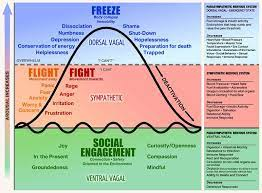Polyvagal Informed Therapies
Polyvagal Informed Therapy
Polyvagal theory informs the work of all practitioners at HeartMind Resiliency. The theory was first described by Dr. Stephen Porge as a neurobiological framework that explores the role of the autonomic nervous system in regulating our physiological and emotional responses to stress and trauma.
At its core, is the understanding that our autonomic nervous system operates on a continuum with three distinct states. The ventral vagal state is associated with feelings of safety, connection, and social engagement; sympathetic arousal is the mobilization response often linked to fight or flight; and the dorsal vagal state represents a state of shutdown or freeze.

Polyvagal theory therapy also emphasizes the importance of creating a safe therapeutic environment. Your therapist will foster a secure and attuned relationship to support a sense of safety and support for your healing. Not only does this feel good, it helps promote neural regulation and resilience.
Polyvagal theory is woven through all the modalities we use at HeartMind Resiliency, from somatically and cognitively-based psychotherapy to massage, yoga and breathwork as it provides a comprehensive framework for understanding and addressing the impact of trauma and stress on the autonomic nervous system. By helping individuals regulate their nervous system responses our understanding of this theory helps support your healing, resilience, and renewed sense of safety and connection in the world.
Polyvagal Informed Therapy at HeartMind Resiliency is a cutting-edge approach to healing that places the autonomic nervous system at the center of emotional well-being. Our therapists are highly trained in this transformative modality, which recognizes the profound connection between our nervous system and how we experience and respond to life’s challenges.
The Polyvagal theory, developed by Dr. Stephen Porges, forms the foundation of our approach. It emphasizes the importance of understanding and regulating the autonomic nervous system to address trauma, anxiety, and stress-related issues. Through this therapy, we guide individuals on a path toward greater self-awareness, emotional regulation, and resilience.
At HeartMind Resiliency, we recognize that each person’s journey is unique. Whether you’re dealing with past trauma, anxiety disorders, or other emotional difficulties, our therapists work collaboratively with you to create a personalized treatment plan. We provide a safe and non-judgmental space where you can explore your experiences, emotions, and bodily sensations.
Polyvagal Informed Therapy enables individuals to reconnect with their innate capacity for healing and growth. By helping you understand how your nervous system responds to triggers and stressors, we empower you to regain control over your emotional well-being. This approach fosters a sense of safety, self-compassion, and emotional resilience.
Our commitment at HeartMind Resiliency is to guide you through the transformative potential of Polyvagal Informed Therapy. We believe in the power of healing and growth, and we are here to support you on your journey toward lasting emotional well-being and a brighter future.
Get Started with Therapy in Richmond, VA, Today!
For immediate help, call 988 or go to your nearest emergency room.
